#gate of angband
Explore tagged Tumblr posts
Text
On either hand the cliffs stood as embattled walls, and upon them sat carrion fowl crying with fell voices.
"The Silmarillion" - J.R.R. Tolkien
#book quote#the silmarillion#jrr tolkien#cliff#walls#carrion bird#angband#gate of angband#gate#beren#luthien#beren and luthien
6 notes
·
View notes
Text
fingolfin is so funny he's like "I'm going to be the image of calmness and duty and rationality in the face of fëanor's impulsive madness" and then in a fit of reckless passion goes and has the wildest ballsiest most insane death imaginable
#like fëanor never even MAKES it to angband when he's the one with the more personal vendetta#meanwhile fingolfin bangs on the gates TWİCE and taunts MORGOTH into SİNGLE COMBAT#like hello you are just at insane as your brother!!!!!! you just bottled it in your entire life and then that bottle was a molotov cocktail#🫡🫡🫡🫡🫡🫡🫡#fingolfin#silmarillion#sunny reads the silm#mp
615 notes
·
View notes
Text

more from the reverse gondolin au
#silm#silmarillion#reverse gondolin au#idril#lomion#celebrimbor#lomion is so fun to draw#featuring celebrimbor with his weird himlad hairstyle#realized i forgot to color his mouth oh well#they made the Three ahead of schedule and single handedly fixed the entire feanorian-nolofinwean feud#thinking abt idrils house of the mole being more focused on protection compared to maeglins mole#if the fall comes (bc aredhel is not quite as cautious as turgon) idril and the house of the mole already have escape and backup escape pla#and reinforced fallback points inside the city when the wall is breached#growing up w eol and foresight means idril always has plans and backup plans and alternate plans and contingencies for those plans too#meanwhile lomion is well equipped with nenya to counter balrogs & fire drakes#idril is the sort of person who hardens inward to defend herself & her family#maeglin hardens outward to preemptively counter perceived threats#despite having an exponentially better late-childhood than maeglin#lomion is still very much traumatized from being orphaned at the Lammoth.#he probably freaks out when rog (his mentor/father figure) leads the hammer of wrath at the gates.#when their positions are switched lomion bonds better with the rest of gondolin#and either never gets nabbed by morgoth or gets promptly rescued on his way to angband.#idril plans for the worst because growing up in nan elmoth#the situation usually ended up being the worst she could predict#so morgoth doesnt have the extra intel#lomion has friends and one of the Three#and idril has an even better prepared version of the Secret Way#and hey maybe gondolin does end up surviving
58 notes
·
View notes
Text
There is an oft-repeated scene in the Silm when one of Our Heroes has died fighting a noble but hopeless battle that they chose, and someone, somehow buries them properly AND it is specifically mentioned in the text that the grave lay undisturbed until some far future date (usually the breaking of Beleriand).
This happens to Finrod, to Fingolfin (though his grave was only undisturbed until Gondolin fell), and Glorfindel. For other dead characters, this precise formula does not occur.
(Beren and Luthien die natural mortal deaths and no one knows where they are buried, Feanor spontaneously combusts and none of his sons' burials are ever mentioned, and Turgon dies & is presumably "buried" in the collapse of his tower. Hurin, Morwen, and Nienor aren't buried [edit: Morwen was buried]; Finduilas and Turin are buried but it is not specifically mentioned that their graves were undisturbed afterwards. Barahir is buried by Beren but it isn't specifically mentioned that his grave was inviolate. Aredhel's grave isn't mentioned, neither is Thingol's, Dior's, or Nimloth's. Aegnor, Angrod, Orodreth, and Gwindor die in battle against the enemy but in a battle that came to them (Bragollach and of Nargothrond respectively) and was one they had to fight, not a hopeless battle that they chose and their graves' aren't mentioned.)
You will notice that I have not mentioned Fingon, who was famously "beat[en] into the dust with their maces...they trod [his banner] into the mire of his blood," or any who died in the Nirnaeth Arnoediad and were dumped in a pile by Morgoth's forces to create the Hill of the Slain/Haudh-en-Ndengin/Hill of Tears/Haudh-en-Nirnaeth.
The Nirnaeth is, of course, the ultimate noble but hopeless battle, and Fingon especially typifies that. (Relatedly, Azahgal's body is successfully borne away by his troops, presumably for a long-lasting burial place.) The Hill of the Slain is meant to be a symbol of Morgoth's power and a place of dreadful carnage and disrespect for those who fell and should break my argument--
But in one sentence Tolkien turns all that around:
"But grass came there and grew again long and green upon that hill, alone in all the desert Morgoth made; and no creature of Morgoth trod thereafter upon the earth beneath which the swords of the Eldar and the Edain crumbled into rust"
--and the symbol of Morgoth's total victory becomes a sacred, untouched grave of heroes.
#they're all elves so it's a Little Odd#that inviolate graves are so important because they get a new body#but it is clearly extremely important#for especially Noble and Heroic characters fighting hopeless battles#to be buried properly (Barahir)#and a few fighting especially chosen Noble but Hopeless battles get the extra special inviolate grave treatment#quotes from Silm Ch 20#AND is hearkens back to the line about grass during the long peace#from Silm Ch 14#'but after the coming of the Sun rich grass arose there#and while Angband was besieged and its gates shut there were green things even among the pits and broken rocks before the doors of hell'#fingon#fingon the valiant#nirnaeth arnoediad#finrod#glorfindel#fingolfin#the silmarillion#haudh-en-nirnaeth#haudh-en-ndengin#tolkien#softlysilver#themes
125 notes
·
View notes
Text
One of the oddest Silmarillion takes that I’ve seen recently is the idea that Beren and Lúthien had it easy.
I mean, let’s take a look at Beren’s life. The Battle of Sudden Flame hits when he’s in his early twenties. He spends five years carrying on a guerilla war against the invasion of his homeland by orcs and other evil creatures; his mother and all his female relatives have to flee, and he has no knowledge of whether they are desd or alive, or captured. There’s a strange darkness speading over the forest and turning it into something out of a horror movie, a place most people won’t even dare to go into. The band of guerillas is slowly whittled down to about a dozen people, who are hunted constantly by Sauron and his wolves. Then, while he is away, his father, his uncles, and everyone else remaining are brutally killed, and he returns to find crows eating their corpses and orcs joking about looting the dead.
He carries on an guerilla alone, against Sauron, for another several years, in the haunted woods od Taur-nu-Fuin. When he absolutely can’t last any longer, he crosses the most horrifying wasteland in all of Beleriand, where the only water present is poisoned and turns you mad, filled with evil spiders and who knows what other creatures. He’s in his early thirties but he’s been through so mich that he looks like an old man. He has lost literally everyone he has ever known; he does not know if any friend or relative of his, anywhere, is still free or living.
Then he meets Lúthien.
When he leaves Doriath on the quest of the Silmaril, which every sane person in Beleriand knows is laughably impossible, he goes to Finrod, the one person he can hope for any assustance from. Finrod has an entire realm; I don’t think Beren is any expectation that Finrod will go with him personally. And what happens? The king of the largest remaining kingdom in Beleriand besides Doriath is overthrown by his own people at the instigation of Celegorm and Curufin and left with only a few loyal people around him. All of whom then die torturously in the dungeons of Sauron, followed by Finrod’s own death saving Beren.
On top of everything else he’s been through, on top of spending several months in despair being tortured in Sauron’s dungeons, the survivor’s guilt that Beren must be feeling is extreme. Even after Lúthien rescues him, it takes him a while to recover. And he still hasn’t made any progress on the quest itself!
Then they’re attacked by Celegorm and Curufin – the people who bear a substantial amount of respinsibility for the death of Finrod and the Ten, the people who very deliberately abandoned them all to due and coerced all Nargothrond to do the same, and the people who kidnapped Lúthien and attempted to force her into marriage – and they try to kidnap Lúthien again, and to murder Beren.
The fact that Beren does not kill Curufin in that moment is a deed of extreme moral fortitude. The difference between Beren and Lúthien compared with many of the Finwëans isn’t that they don’t face temptations, or that their choices are easy, it’s that they overcome those temptations.
So. Beren spares Curufin’s life at Lúthien’s urging and Curufin immediately tries to murder Lúthien; Beren jumps in front of the arrow, is severely wounded again, and for the third time since they met Lúthien gets to work healing him. Virtually all of their time together has been spent with Beren recuperating from physical injury, psychological injury, or both.
And as soon as Beren recovers, he walks away from the one person who loves him who’s still alive, and prepares to rob the gates of Hell, alone. Because Beleriand is dangerous, and as long as Lúthien is with him and therefore unable to go anywhere safe, she will be in danger from both the servants of Morgoth and the sons of Fëanor. And even if there’s a virtual 100% chance that him walking into Angband will lead to him being slowly tortured to death, that’s a better option than the one person he has left getting killed or, worse, captured, because of him.
And then she goes with him anyway. And beyond all hope they actually succeed in getting a Silmaril - and then he immediately loses it, and his hand, to Carcharoth, and it was all for nothing.
And for the fourth time since Lúthien met him, he’s near death and she’s desperately fighting to heal him and kerp him alive, while she’s exhausted to the point of collapse. And this is the moment when she gives up and goes back to Doriath, because that is what has the best chance of keeping Beren alive.
And then, at last, a ray of hope – Thingol looks at all they’ve been through and says, fine, you crazy kids can get married. And they’ve scarcely been married yet when they learn that oh, it’s not over, Carcharoth is rampaging through the land killing people and this needs to be dealt with. And Beren, even after everything, insists on going. (Because, hello, survivor’s guilt! he probably feels that this is his fault for, uh, getting his hand bitten off.)
(The fact that the Silmaril was, for a time, inside a wolf and outside Doriath, and Celegorm, noted hunter, never got near it, is, okay, rather amusing to me.)
And then Beren dies, saving Thingol, because he knows deeply what it feels like to lose his family and he’s not going to let that happen to Lúthien. And she loses him instead.
Now let’s shift to Lúthien’s point of view. Since her first meeting with Beren she has been betrayed by literally everyone she knows and everyone she meets except for Beren and Huan. She has been treated like a child, and a madwoman, and a trophy, and a pawn, and a sex object, and literally everything except an adult person whose choices have worth and meaning. She is not a superhero; she does not know what she is doing; she is terrified for practically every moment of it, for Beren’s sake even more than for her own, and for much of it she is hopeless. She does not know how or if she can achieve anything; she only knows that she has to try, because it is better than sitting in Doriath waiting to find out if Beren is dead. She puts substantial work and thought and effort into figuring out how to get out of Doriath (given in more detail in the poetic version) – and then, just when she thinks she’s found help (note: Celegorm and Curufin do not give her their names when they first meet her; she doesn’t know they’re the sons of Fëanor), she is again taken captive, this time with the goal of forced marriage and the threat of rape hanging over her. And she still knows Beren is in desperate danger, and she still can do nothing about it.
When Huan aids her and she goes to Tol-in-Gaurhoth, it isn’t because she feels she has the power to fight Sauron one-on-one! It’s because she’s desperate and can’t think of any other options. And in fact, it is not she who defeats Sauron, it is Huan; once he is defeated by Huan, she has the intelligence and strength of will to force his surrender by threatening him with something he fears more than defeat, and to demand – not the freeing of Beren alone – but the destruction of Tol-in-Gaurhoth, freeing all its prisoners. The reason she defeats Sauron is not that she’s a half-Maia badass who can wave her hands and do everything easily! The reason she defeats him is that she shows up there completely vulnerable and in effect uses herself as bait. That is an extraordinary degree of courage, not some kind of deus ex machina. And she’s putting all the strength that she has on the line – she’s pretty much passing out by the time she finds Beren. Similarly, all her healing of him is hard, exhausting work that she’s doing despite being, the whole time, terrified that he’s about to die. None of this is easy.
Likewise in Angband – Huan’s advice and Lúthien’s magic of disguise and sleep is invaluble in getting them through the door and past Carcharoth, but the reason she is able to enchant Morgoth and cast all Angband into sleep is not primarily because of extreme power, but because, like every other non-Beren person she meets, he doesn’t take her seriously. Morgoth finds the idea of using Melian’s daughter as a brief entertainment amusing (and, if you read the poetic version, makes some truly creepy sexual threats against her), and that’s how she is able to get him unguarded enough that she’s well into her song and he’s already getting sleepy before it starts to occur to him that maybe this isn’t going quite as he planned. Lúthien’s victories are not because she’s just on a different power level from the rest of Beleriand, they’re because she’s amazingly brave and willing to walk into the most dangerous places virtually defenceless. And she and Beren rely on each other utterly – after her sleep song she’s practically passing out and can only get out of Angband because Beren is holding her up.
So this is who they are, at Beren’s death. A man who has lost everyone he loves and everyone who loves him, every friend or family, often helplessly witnessing their gruesome death – everyone except for Lúthien. And an elf-woman who has been betrayed by everyone she loved or trusted, except for Beren.
When Beren dies, I wonder if he’s even relieved that it’s finally him dying instead of everyone around him. When he sees Lúthien in the Halls of Mandos, I believe his first feeling would be not joy or love, but horror. That the last living person he loved, and the one he wanted above all to save, had now died because of him.
But Lúthien isn’t done. She goes to Mandos, and she sings, and her song says: look at what we have been through, look at what all Beleriand has been through, Eldar and Edain. We don’t want realms or glory or power; we only want a few moments of peace with each other, and we fought so hard for it, and we didn’t even get that. And when she’s offered bliss and immortality for herself, she says No, I don’t want it, not without Beren. She isn’t promised happiness or long life – she only know that for the short time she will get, she will have the chance to be with Beren. And that is enough for her; for that, she gives up everything else.
This is a faerie-story; but it does not sound to me like a trite tale of easy victories handed to the heroes by Fate or by the author! They fought and struggled and sacrificed for those victories, amd they did it without ever letting go of courage, and mercy, and humility. There is a reason why this is the story that Frodo and Sam hearken back to for inspiration.
#tolkien#the silmarillion#beren and luthien#beren#luthien#look you can’t dismiss this and then go: look at all maedhros has been through! he was captive he lost a hand#he had friends die in horrible ways because of decisions he made#all his family died#SO DID BEREN#he just didn’t go evil because of it#so don’t turn around and tell me he had an easy life!#maedhros had several hundred years in paradise#beren was fighting a hopeless war pretty much as soon as he hit adulthood!#the two people on their own are NOT the ones who have had things handed to them#the finweans had fortresses and armies and kingdoms and they DECIDED to walk into a war for vengeance and power#tolkien’s greatest heroes are always the ones who would rather live simply and peacefully#and who go through darkness and danger because they must
169 notes
·
View notes
Text
A Message of Hope: Aurë entuluva

For absolutely no particular reason, I felt compelled today,- November 6th of 2024, to write about hope.
There are days when Hope feels foolish; when you have just watched in horror as things that once seemed sturdy and unbreakable, crumble and burn. Whether it is an elvish city or a chosen path, when that happens, Hope feels naive. It feels like that's what lead you here to begin with. It feels like, if you had been more realistic and pessimistic, you wouldn't be so hurt.
For all of the things that Tolkien wrote about, his message of hope was perhaps the most resilient, poignant, and enduring. Few can forget Sam's hopeful message to Frodo:

Yet, today, for many people it may not feel that this is true. I know I often struggle with hope, but today does feel exceptionally difficult (for no particular reason, of course).
Tolkien's most hopeful message, for me, comes from his bleakest story. Húrin's story is one of defeat. Courage sprang alive when high King Fingon and the elves and men fought together against the blackness of Morgoth's reign. The Nirnaeth Arnoediad, or Unnumbered Tears, was a day when victory was close and Turgon, brother of the king, arrived with a mighty host,
"Then When Fingon heard afar the great trumpet of Turgon, the shadow passed and his heart was uplifted, and he shouted aloud: 'Utúlie'n aurë! Aiya Eldalië ar Atanatarni, utúlie'n aurë! The day has come! Behold, people of the Eldar and Fathers of Men, the day has come!' And all those who heard his great voice echo in the hills answered crying: 'Auta i lómë! The night is passing!' "
They believed that their courage and steadfastness had saved them, that daybreak was soon at hand. Tolkien understood, perhaps better than most, that there was a difference between courage and hope. For courage is what spurs action, brings change, and inspires duty. Courage is what makes the difference when the time has come, just as they continued to fight on against orcish hordes. It was courage that led them into the heart of Angband where the Dark Lord himself sat shaking on his throne. Courage carried them past the gates, but betrayal can cut through courage like a hot-knife through butter. The hill men betrayed the men and elves and the dawning light turned into a simmering dusk.
Darkness had returned.

So, where was the hope?
With the elves slain or fleeing, Húrin, leader of his people fought valiantly to let his people and what was left of his elvish allies escape. Courage did survive the betrayal of the wild men, but only just. And with each swing of his axe he cried out, "Aurë entuluva!" And with each felled enemy, he cried out again, "Aurë entuluva!" Even as his enemies surrounded him, overtook him, and even when taken by the enemy into the dark halls, he cried out for any allies that might hear him, "Aurë entuluva!" It was a promise of hope.
~ "Day will come again!"
Hope is not what makes us act, it is not what leads us to change: hope is what sustains us, what keeps us going when courage has faded and the dark night envelopes us. Húrin held fast to hope when courage and Valor had failed, when the efforts of good people fell short. I do not know what the future holds, bleak as it may seem, but I keep those words near me with every passing hour and in those moments where I feel as though I have been dragged into a dark lord's dungeon, I say those words:
Aurë entuluva!
Day will come again!
-
Courage will be needed when the day arrives, but until then, I will cling to hope.
I wish everyone peace and hope. It is the dearest thing I can wish. And remember, Aurë entuluva!
Namárië,
~ Ramoth13
#ramoth13#silmarillion#the hobbit#tolkien#jrr tolkien#lord of the rings#rings of power#the lord of the rings#rop#húrin#fingon#turgon#maedhros#morgoth#november 5th#hope#Aurë entuluva#samwise gamgee#frodo#nirnaeth arnoediad#elrond#hope and courage
117 notes
·
View notes
Text
→ dark!reader masterlist




PAIRING → mairon | halbrand | annatar (sauron) x f!elf!reader
WARNINGS → 18+ mdni - dark!reader, mentions of abuse, pregnancy, smut, dark themes, manipulation, murder, mentions of blood, possessiveness
SUMMARY → in which you have spent ages with your beloved husband and carved a life out for you both, even if it may lead you down an irredeemable path toward despair and destruction.

In the First Awakening, when the stars were young and the light of the Valar shone pure, a maiden was brought forth, fair beyond mortal ken. Her hair was spun like the finest strands of silk weaving, and her eyes were set with the light of Eä itself, kindled from the stars that Varda had strewn across the heavens. Her skin glowed like the first light of Ithil upon the world, for Ilúvatar himself had fashioned her, giving her the grace of the Valar, yet with a spirit of unknown depth.
In time, she bore a child—a child whose beauty struck awe and unease in the hearts of the Elves, who whispered that her spirit held a shadowed aspect. They feared her as they feared the night, and some spoke in hushed voices that she was wrought not by the hand of Eru alone, but by the dark forces that lurked, unseen, in the depths. For a purpose shrouded in mystery and woe, it was said, had woven her spirit.
When Oromë, great hunter of the Valar, found her people, he drew them forth with words of light, but when he beheld her, he turned aside. At the pleas of her mother, who implored his mercy, he spoke in solemn prophecy, saying, “This child was fashioned in love, yet bears the mark of shadow. Sorrow and ruin shall follow in her steps; she is not counted among my beloved Eldar.” So it was that her mother went into the West, grieving deeply, leaving her child to grow under the twilight’s hold.
In those days, the maiden’s heart darkened further, though surrounded by the praise of her new kin, who marveled at her beauty. Yet her spirit grew chill, filled with bitterness toward the Valar, until the allure of the Moriquendi path ensnared her wholly, and in the dark she became enmeshed, bound in heart and thought to the shadow’s deep call.
Far away in Angband, a dark being stirred. He felt the lure of the shadow growing within her, the darkness that had woven itself into her soul. She, who was fair as starlight yet rotten with hate, would not find her place in Aman but would suit his own grand purpose. And though his desire burned, he withheld himself, for patience was his art. And in the fullness of time, his waiting would be repaid, for she would be his Queen.

. . . p a r t s ( c h r o n o l o g i c a l ) 🌋 → smut
your divine 🌋 → you have been sauron's betrothed since the days of old, his faithful servant. you spend your days carrying out his plans in Eregion, but with each passing century, you long for your husband's awaiting arms until one day you finally get your wish. the bearer of fruits 🌋 → after your husband’s departure of Eregion, you are left hollowed and sorrowed. you find solace in your work and planting your seeds until an unexpected visitor shows up at the gates of Eregion.
#sauron x reader#halbrand x reader#annatar x reader#mairon x reader#trop fic#halbrand#annatar#mairon#sauron#fic masterlist#rings of power fic
58 notes
·
View notes
Photo
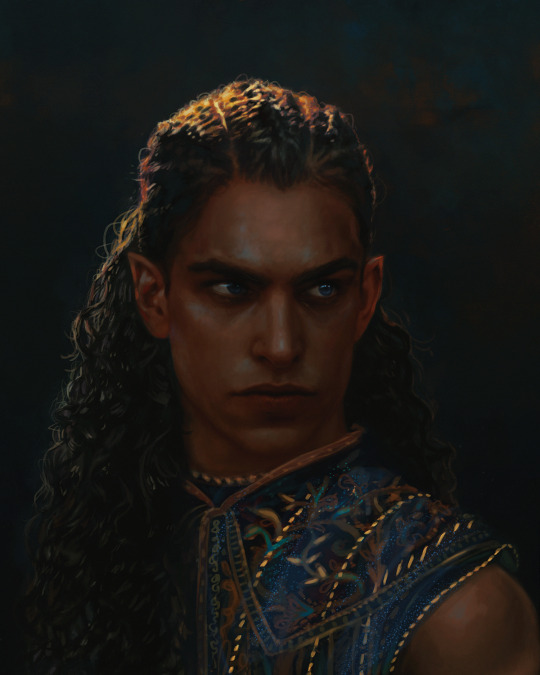
Thus he came alone to Angband's gates, and he sounded his horn, and smote once more upon the brazen doors, and challenged Morgoth to come forth to single combat. And Morgoth came ⁜
2K notes
·
View notes
Text

“Thus he came alone to Angband’s gates, and he sounded his horn, and smote once more upon the brazen doors, and challenged Morgoth to come forth to single combat. And Morgoth came.” - The Silmarillion, J.R.R. Tolkien
#the silmarillion#lord of the rings#middle earth#Tolkien#fingolfin#noldor#morgoth#melkor#medieval art#fantasy art#illustration#art
118 notes
·
View notes
Text
the fact that maedhros cried out to fingolfin's host when he heard them arrive at the gates of angband breaks my heart every time i remember it. did he call fingon's name specifically? did he actually think his voice could reach them?
125 notes
·
View notes
Text
Now Beren lay in a swoon within the perilous Gate, and death drew nigh him, for there was a venom on the fangs of the wolf.
"The Silmarillion" - J.R.R. Tolkien
#book quote#the silmarillion#jrr tolkien#swoon#gate#peril#death#venom#fangs#wolf#werewolf#beren#angband#gate of angband#carcharoth#luthien#beren and luthien
2 notes
·
View notes
Note
reading maedhros portions of the silmarillion is crazy I wanna grab him and squeeze him till he pops
YOU AND THE NARRATIVE BOTH, BROTHER
#😩😩😩😩😩😩😩😩😩 AND ME TOO#him crying out and nobody hearing him when fingolfin bangs on the angband gates...... delicious 🫡#anonymous#replies
10 notes
·
View notes
Text
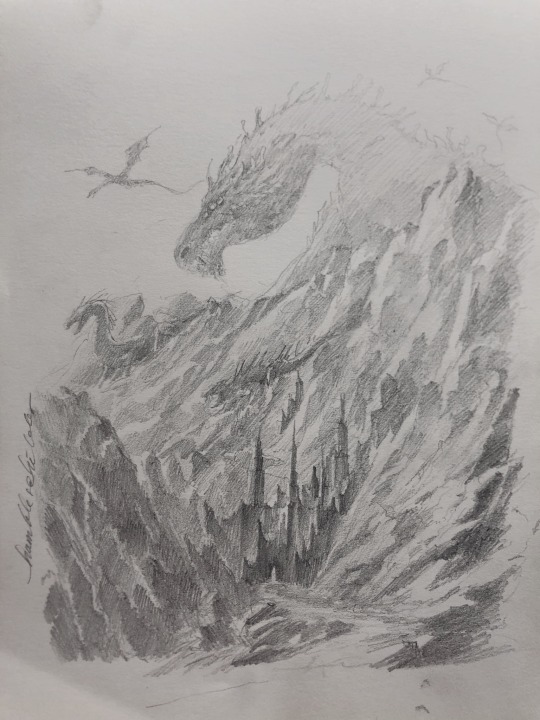
The gate of Angband and The Black dragon as tall as mountain. Yup, I know this is not finish yet, it's a rough quick sketch anyway.
This will be the opening scene for my War of Wrath illustration. Stick around for my upcoming illustration, but probably I'm gonna post the final piece on my Artstation page.
#silm art#silmarillion#tolkien legendarium#angband#war of wrath#beleriand#illustration#drawing#sketch#details#art#lotr#fanart
137 notes
·
View notes
Text
I Read The Silmarillion So You Don't Have To, Part Seven
Previous part.
Chapter 18: Of the Ruin of Beleriand and the Fall of Fingolfin In which everything goes to hell. Again.
Remember the Siege of Angband? Yeah, that’s still going on. It’s been roughly two hundred years since Morgoth’s last attack (the first appearance of Glaurung the Dragon), and in all that time, the Elves haven’t made much progress. Fingolfin, the High King of the Noldor, considers launching another assault on Angband; his people are strong, and now they have the Men on their side. What Could Possibly Go Wrong?

Fingolfin by Insant
The other Noldor are less enthused by this idea. For once, things are pretty great. Why risk the peace and prosperity that the Elves currently have for the chance at defeating Morgoth, when there’s bound to be massive loss of life either way? Only the Elven lords who live in the far north — on Morgoth’s doorstep — agree with Fingolfin, since they can’t ignore Morgoth as easily. They’re shot down by everyone else, so, there’s peace for a little while longer.
That’s when Morgoth makes his move.
Morgoth has been steadily gathering his forces throughout all of that time, and he’s also grown more and more spiteful. He doesn’t just want to defeat the Noldor, he wants to defile their homeland. But his hatred has also made him impatient.
One winter, on a dark night, without any warning, rivers of lava suddenly come pouring down the Thangorodrim, which belch poisonous gases into the air, rendering the whole plain of Ard-galen a barren wasteland overnight. Also, unlike with natural volcanoes, the damage is permanent — Ard-galen becomes known as Angfauglith, which means “Gasping Dust.” Instant Mordor, Just Add Lava. Many poor Elves are swallowed up by the lava before they can react.
As if that weren’t bad enough, Glaurung returns, accompanied by Balrogs and entire armies of Orcs — more Orcs than the Noldor have ever previously seen. The ensuing battle lasts all winter, as Morgoth’s forces return fire on the Noldor. It becomes known as Dagor Bragollach, the Battle of Sudden Flame.
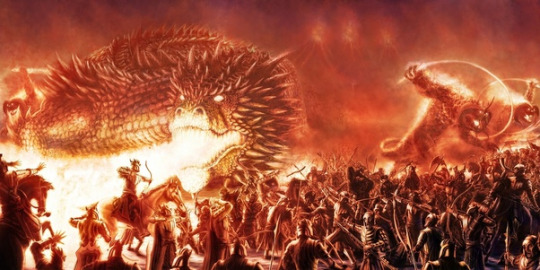
Battle of Sudden Flame by Jovan Delic
There are many casualties. Angrod and Aegnor, the brothers of Finrod and Galadriel, both die in the battle. Finrod himself gets cut off in the Fen of Serech, and almost dies, but he’s rescued at the last minute by a Man named Barahir. Finrod escapes with his life, barely, and manages to make it back to his palace in Nargothrond. Finrod pledges undying friendship to Barahir, promises to help him and his family in return if they should ever need him, and gives him his ring as a token of his promise. It’s a ring shaped like two intertwined snakes, set with green stones, and it becomes known as the Ring of Barahir.
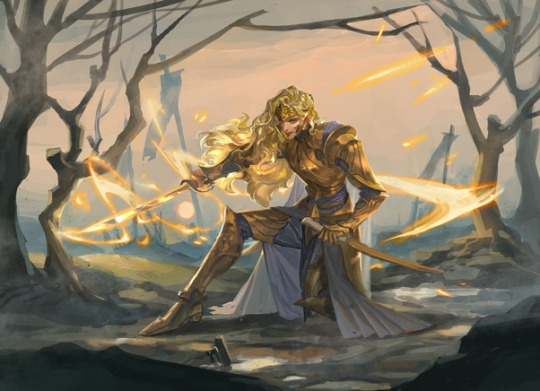
Finrod in the Fen of Serech by pansen1802
Incredibly, Fingolfin and co. manage to hang on to their land of Hithlum, but not without heavy losses. Hador Lórindol, one of the Kings of Men who was Fingolfin’s thane, dies in the battle. In the East, Fëanor’s sons aren’t doing great, either — Celegorm and Curufin are both defeated, but not killed; they retreat all the way to Nargothrond and hide there with Finrod. Caranthir’s land is ravaged, too.
Maedhros, however, “burned like a white fire.” He’s been dying to get his revenge on Morgoth for having strung him up on Thangorodrim, and personally slaughters so many Orcs that they start to run in fear of him. He manages to hang on to his fortress, and many people rally to him, including his brother Maglor.
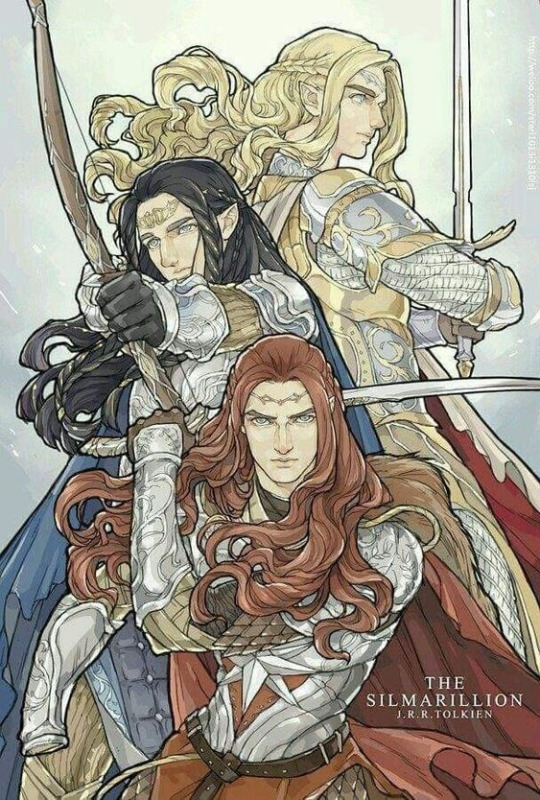
Finrod, Fingon, and Maedhros by star热爱生活呀巴扎嘿
Overall, the battle is really bad. Fingolfin stares out over the ruined lands, sees his family scattered, and realizes the Noldor are done for. He’s filled with rage and despair, but he isn’t ready to give up yet. There’s only one thing to do. He mounts his horse, Rochallor, and rides straight to the gates of Angband. Those who see him think he must be Oromë, the Vala of the hunt, because he burns with fury and his eyes glow. He blows his warhorn, bangs on the gates of Angband, and challenges Morgoth himself to a duel.
That may be the ballsiest move of any Elf so far (and yes, I’m counting Fëanor going up against an army of Balrogs).
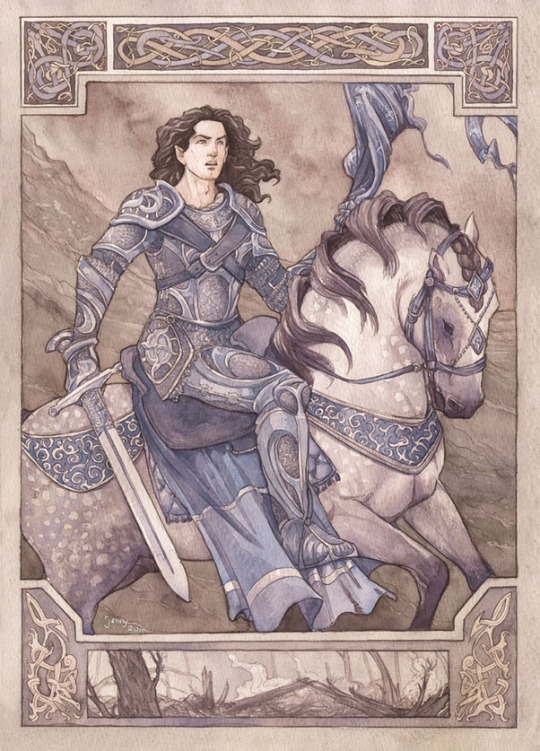
Fingolfin’s Challenge by Jenny Dolfen
Now, throughout all this, Morgoth has spent most of his time hiding in his fortress. Sure, he’s a Vala, and technically the most powerful being in Middle-earth, but he doesn’t fight his own battles. Fingolfin calls him a coward who’d rather send out all of his evil minions to fight for him than come and face him like a man. Morgoth can’t ignore that. So, to the surprise of everyone, Morgoth actually comes. And we get this badass description, which I’m going to transcribe, because I can’t do Tolkien justice:
Therefore Morgoth came, climbing slowly from his subterranean throne, and the rumour of his feet was like thunder underground. And he issued forth clad in black armour; and he stood before the King like a tower, iron-crowned, and his vast shield, sable-blazoned, cast a shadow over him like a stormcloud. But Fingolfin gleamed beneath it as a star; for his mail was overlaid with silver, and his blue shield was set with crystals; and he drew his sword Ringil, that glittered like ice.
Oh, it is on!
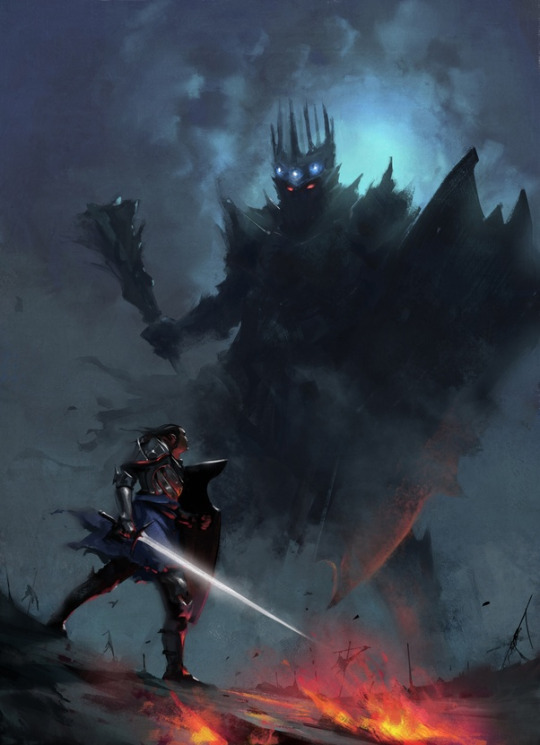
Fingolfin vs. Morgoth by Marchesi

The Fall of Fingolfin by Wavesheep
The battle is epic. Morgoth tries to smash Fingolfin with his hammer, called Grond (GROND! GROND! GROND! GROND!), but Fingolfin is too quick. Every time GROND hits the earth, it creates a volcanic cleft in the earth. The battle is compared to a thunderstorm, with the strikes of Morgoth’s hammer being the thunder and Fingolfin darting around being the lightning. Fingolfin actually manages to wound Morgoth, seven times! Each time, Morgoth howls so loud that all of the Orcs cringe in fear.
Fingolfin can’t keep it up forever, though. He’s mortal, and he’s going up against something near to a god. Three times, Morgoth crushes him with his shield, and three times Fingolfin is able to pick himself back up again. He doesn’t have much space to move anymore, because the ground around him is full of holes. He stumbles and falls, and Morgoth presses his foot to Fingolfin’s neck. It’s like getting an entire hill dropped on top of him. Fingolfin isn’t going to go peacefully, though — with his last bit of strength, he cuts deep into Morgoth’s foot.
Fingolfin dies, and thus passes the strongest and most valiant of the Elven kings. The Elves are so sad to lose him that they don’t even sing about the battle. The Orcs don’t gloat about it, either, even though Morgoth won — it was kind of a Pyrrhic victory, because it’s embarrassing that a mere mortal was able to do so much damage to Morgoth. The reason why we know what happened, despite the lack of songs about it, is because Thorondor (the King of the Eagles) brings the news to Gondolin and Hithlum.
Thorondor also saves Fingolfin’s body from being desecrated by Morgoth. Morgoth goes to throw Fingolfin’s corpse to the wolves, but Thorondor swoops down and claws him in the face. Thorondor brings Fingolfin’s body to Gondolin, and Turgon builds a cairn for his father in the surrounding hills. For a while, Fingolfin’s tomb acts almost like a charm that keeps the Orcs away. (But not forever though. Because, in case you forgot, Gondolin is doomed.)
Morgoth’s wounds are permanent. His seven initial wounds never heal, he now limps everywhere he goes because Fingolfin damaged his foot, and his face is also scarred where Thorondor got him.
All of Hithlum mourns Fingolfin’s death. Fingon, in his grief, becomes the sole High King of the Noldor.
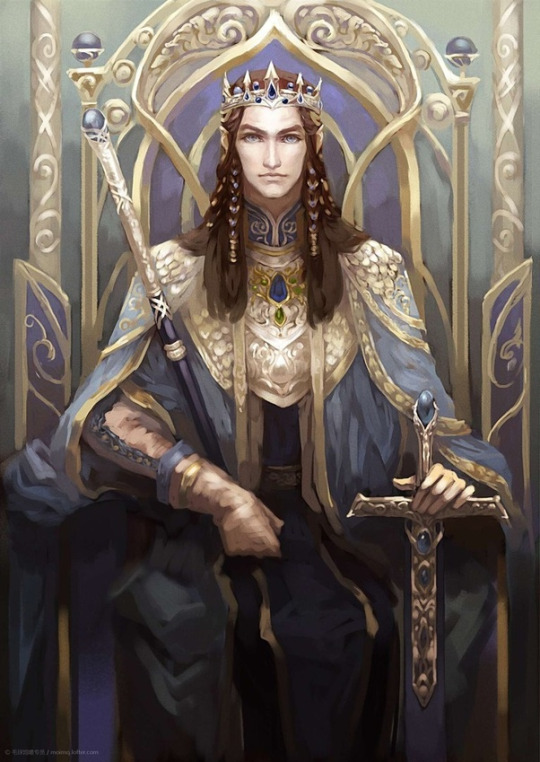
Fingon by Moimq
There’s an interesting note here: Fingon sends “his young son Ereinion (who was later named Gil-galad) […] to the Havens.” This is an outright inconsistency. In other sources, Gil-galad is the grandson of Angrod, Finrod’s brother. So, it’s legitimately unclear who Gil-galad’s father was. Oh well. Distant legendary past, oral tradition and all that. I’m sure the songs disagree on whose parents are whose all the time.
And, the “Havens” referred to here aren’t the Grey Havens, either. They’re two cities in the southwest of Beleriand. But they’re ruled by the same Elf, Círdan, who would rule the Grey Havens later.
Morgoth is now in control of most of northern Beleriand. Barahir, the Man who helped save Finrod, keeps fighting for some time, alongside his wife Emeldir. But Morgoth destroys their land little by little. That land becomes so dark and evil that even Orcs avoid it, and it gets a new name: Taur-nu-Fuin, “The Forest under Nightshade” (which is cool as hell). This forest is like a proto-Mirkwood. Its trees become tangled with claw-like roots and branches, and it becomes full of angry spirits that can drive travelers mad.
The situation gets so dire that Emeldir leads her people away. They end up in the Forest of Brethil, which is where Haleth, another badass warrior-queen of Men, led her people in a similar moment of desperation. All of Barahir’s men are killed fighting Morgoth except for a small handful (whose names are all listed, of course). The Elves don’t come to help them, so they become desperate, hunted outcasts who live in the wilderness. One of these outcasts is Beren, Barahir’s son, who’s about to become very important.
The Elves managed to maintain control over Minas Tirith, the tower that guards the pass separating Morgoth’s lands in the north from the rest of Beleriand. This tower is maintained by Orodreth, Angrod’s son and Finrod’s nephew. But after two years pass, the tower is besieged by Morgoth’s lieutenant, Sauron.
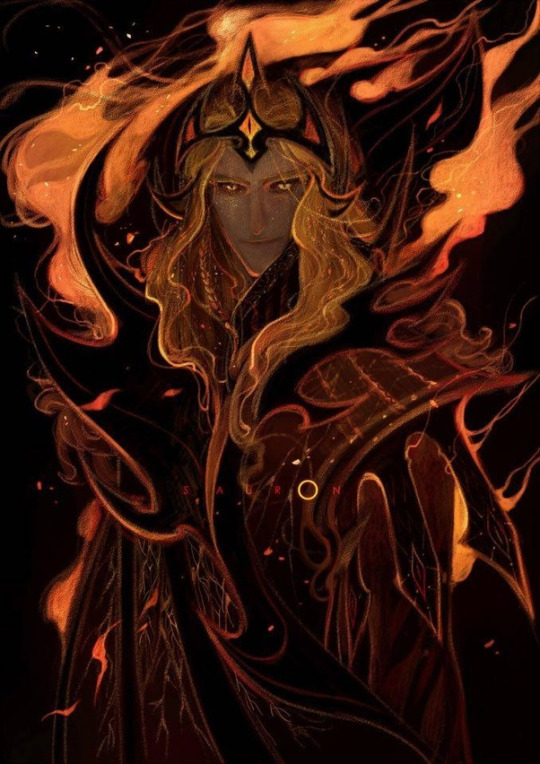
Sauron by Wavesheep
(Oh yeah I’ve been waiting to dip into my self-indulgent collection of Sauron pictures.)
At this point, the Elves call Sauron “Gorthaur the Cruel.” He has become…
a sorcerer of dreadful power, master of shadows and of phantoms, foul in wisdom, cruel in strength, misshaping what he touched, twisting what he ruled; his dominion was torment.
He’s basically like Morgoth 2.0, and there’s very little left of him that is still Mairon, the Maia smith that he once was. Still, Sauron and Morgoth aren’t interchangeable; while Sauron is certainly very evil, he doesn’t think the same way that Morgoth does. If you’re familiar with the D&D alignment chart, Morgoth is pure Chaotic Evil — he doesn’t have a motive beyond fucking things up as much as possible. Sauron is more Lawful Evil, more like an evil dictator. Morgoth wants to watch the world burn (and just did, a moment ago); Sauron wants to rule over the ashes.
Sauron’s assault on Minas Tirith is successful. (If Sauron had a nickel for every time he besieged a tower called Minas Tirith, he’d have two nickels, which isn’t a lot, but it’s weird that it happened twice.) He conjures a cloud of pure terror that causes Orodreth and his men to panic, and flee to Narthothrond. Then, much like Sauron would corrupt Minas Ithil and Osgiliath eons later, he transforms Minas Tirith into an evil watchtower. Tol Sirion, the island where it’s located, becomes known as Tol-in-Gaurhoth, the Isle of Werewolves.
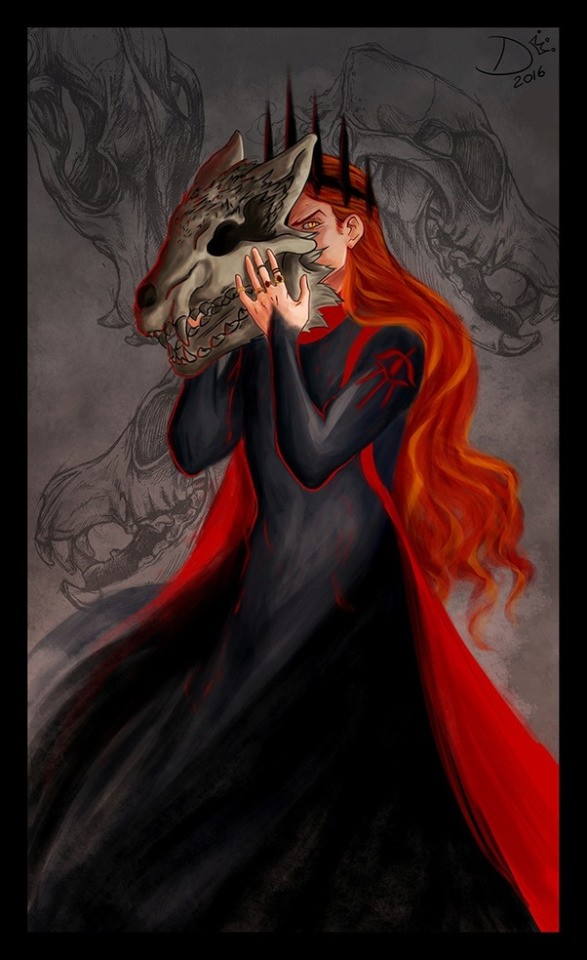
Lord of Werewolves by Dracontessa
After that, things only get worse. The Orcs spread across Beleriand, kidnapping Elves and desecrating all the land around Doriath. Morgoth sends out a bunch of spies to sow discord in every kingdom, hoping to win a psychological battle. Because of the Curse, most of the Noldor believe the sugary lies. The dirtiest trick that Morgoth pulls is setting free some of the Elves that he took captive, while keeping them under his control. This causes the Noldor to distrust even their own families.
With Men, Morgoth tries a different tactic. He attempts to turn them against the Elves by pointing out that the Men are inferior to Elves, and that the Noldor are inherently untrustworthy and untrusting. He promises the Men that if they come and join him, “the rightful Lord of Middle-earth,” then they’ll have honor and rewards and yada, yada. The Men don’t fall for this, which makes Morgoth even more spiteful towards them.
The Three Great Houses of Men are in complete disarray at this point. The house of Bëor —Barahir and his people — is basically destroyed, with the remainder barely surviving in the wilderness. The House of Hador are all stuck in Hithlum, and Hador himself is dead. The only remaining Men in the rest of Beleriand are the house of Haleth — the Haladin — who live in the Forest of Brethil. They’re one of the last lines of defense between Nargothrond and Morgoth’s onslaught. Hador’s grandsons, Húrin and Huor, are camped out in the Forest of Brethil with the Haladin. Halmir, the current leader of the Haladin, sends for backup, and a small army of Sindar Elves from Doriath come to help defend the forest. With the Elves’ help, the Men drive back the Orcs.
Húrin and Huor are some of our major players among the Men. They’re brothers, and they’re currently teenagers. Back before the battle, their father married Halmir’s daughter, so they’re members of the Haladin on their mom’s side. During the battle, they are separated from the rest of their company, but Ulmo protects them with a magical mist from the River Sirion, and then Thorondor rescues them when they wander near his mountains. Thorondor sends two eagles to pick them up, and the eagles bring them to Gondolin. Húrin and Huor become the first Men to ever see the secret Elven city of Gondolin.
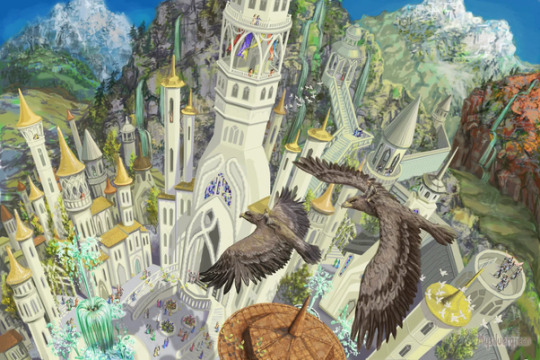
By Mysilvergreen
King Turgon receives them well. He’d gotten a prophetic dream from Ulmo, telling him he’ll need the Men’s help when things get bad, so he takes them in as his honored guests. Húrin and Huor live in the mystical Elven city for a year, and they learn a lot from Turgon in that time. Turgon wants to keep them in Gondolin, not just because of his proclaimation that no one can ever leave it, but also because he genuinely loves them. Eventually, though, they want to go home.
Remember how well that went the last time, with Aredhel?
Húrin reminds Turgon that Men don’t live very long, so he and his brother can’t just wait until things cool off, especially with their family thinking they’re dead. Also, they were carried into the city by eagles, so they have no idea where the entrance is and probably couldn’t find it again on their own. Turgon thinks that this is reasonable, and agrees to let them go, so long as Thorondor is willing to let them leave the way they came, by eagle-taxi.
But Maeglin — remember him? He’s the edgy Elf — Maeglin is happy that Húrin and Huor are leaving, because they’ve been soaking up all the king’s attention. Maeglin snidely tells Húrin that Turgon wasn’t so lenient in the past, like that time he threw Maeglin’s father off the walls.
To pacify Maeglin, Húrin and Huor swear an oath not to reveal anything about Gondolin. As you’ve probably gathered by now, oaths are serious business. I almost guarantee that this is going to bite them in the ass.
When Húrin and Huor return home, their family is overjoyed to see them, because they all thought that the brothers had died in the wilderness. Their father, Galdor, asks where they’ve been, and why they look like princes instead of like they’ve been living in the wilderness for a year. Húrin tells him that the only reason they were allowed to return at all was if they swore not to speak about it, so… don’t ask.
Meanwhile, King Turgon learns that the Siege of Angband is officially over, and Morgoth killed Fingolfin. Turgon doesn’t want to involve himself in the war, at least not yet — Gondolin is a secret safe haven for now, and he wants it to stay that way for as long as possible. It’s like the Wakanda of Elven cities.
However, Turgon also realizes that this is the beginning of the end for the Noldor, unless they can find some outside source of help. He sends secret bands of Gondolin Elves to sail to Valinor. That’s a truly desperate move, since the Noldor are exiles, and Valinor has wanted nothing to do with Middle-earth for centuries. Unfortunately, none of Turgon’s emissaries make it; the western sea has become much more dangerous ever since Valinor cut itself off. The sea is full of enchantments and illusions, and Valinor itself is hidden. There’s no way to get to it. With every failed mission, Gondolin’s doom inches closer and closer.
Guess who hears about it? Morgoth. Morgoth is very interested to know what happened to Finrod and Turgon, because Elven kings don’t just vanish off the face of the earth. He knows they must be somewhere, probably plotting a new scheme to take him down. He knows what Nargothrond is, but not where it is, and he knows nothing about Gondolin. In the Battle of Sudden Flame, he made the mistake of underestimating the strength of the Elves and Men. Although he won the battle, they managed to hit him back just as badly. He’s not about to make that mistake again.
Morgoth attacks Hithlum again. King Fingon is outnumbered, but rescued at the last minute by ships full of warriors sent by Círdan. The Elves win the battle, but King Galdor, Húrin and Huor’s father, dies in the same spot where his own father fell during the Battle of Sudden Flame. Húrin becomes the new patriarch of his house, and serves as Fingon’s thane. He marries Morwen Eledhwen, a woman of the house of Bëor, who fled the Forest under Nightshade for the Forest of Brethil alongside Queen Emeldir.
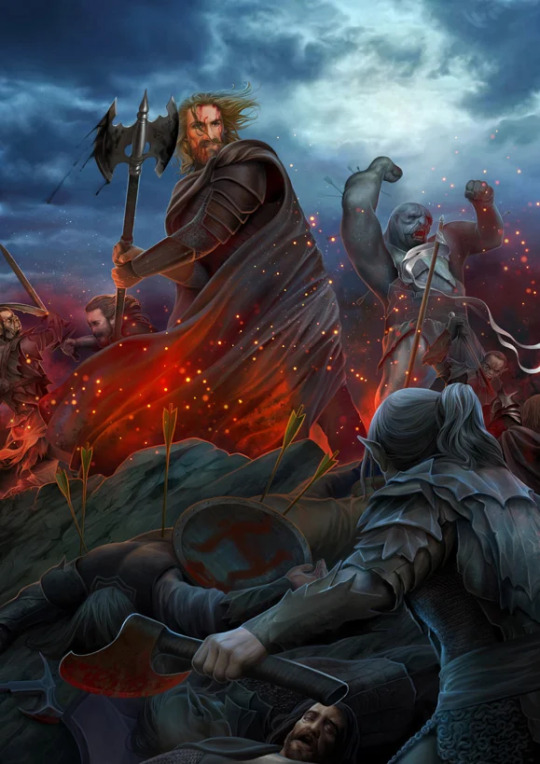
Húrin by Steamey
The House of Bëor is by this point reduced to only one man, Emeldir and Barahir’s son, Beren.
Chapter 19: Of Beren and Lúthien, Part One In which we hear the greatest love story ever told.
This is the first of what Tolkien called “The Great Tales,” some of the oldest stories in the Legendarium, all of which were ultimately unfinished. To put into perspective just what a big deal this story is, Tolkien and his wife Edith have the names “Beren” and “Lúthien” written on their respective headstones. The version here in the Silmarillion is the most complete, but it’s also an abridged version. This is how Tolkien introduces it:
Among the tales of sorrow and of ruin that come down to us from the darkness of those days there are yet some in which amid weeping there is joy and under the shadow of death light that endures. And of these histories most fair still in the ears of the Elves is the tale of Beren and Lúthien.
Most of my retelling here is paraphrased from the Silmarillion, but I’ve included some details that appear only in the Lay of Leithian, Tolkien’s unfinished poetic telling of the story. It’s really worth going and reading the Lay of Leithian; it’s extremely vivid and evocative, it perfectly imitates the medieval poetic form.
The story doesn’t actually start with Beren. It starts with an account of what happened to Barahir and his remaining men after they fled the Forest under Nightshade. They ended up camping out beside a lake called Tarn Aeluin, which is beautiful and reflects the stars. It was supposedly blessed by Queen Melian, and her magic repels the evil creatures that took over the rest of the forest. Barahir and co. are well hidden there, but Morgoth commands Sauron to find them.
One of Barahir’s people is a man named Gorlim, who has a wife, Eilinel. They love each other even despite the war, but when Gorlim returned home one day after a battle, he found his house empty and Eilinel gone. He still follows his people and hides out near the lake, but he holds out hope that maybe his wife isn’t dead. He periodically leaves the secret safe haven and returns to the empty house, hoping that his wife will be there. One time, he sees the lights on and hears her voice, but it’s a trap — Sauron found him. Sauron tortures Gorlim to force him to reveal the location of Barahir’s secret camp, but Gorlim holds out. That is, until Sauron tells him to name his price. Gorlim asks to see his wife again.
Then Sauron smiled, saying, “That is a small price for so great a treachery. So shall it surely be. Say on!”
Poor Gorlim reveals the location of Barahir’s camp. Then, with a mocking laugh, Sauron reveals that Eilinel is dead, and that he cast an illusion to ensnare him. “Oh, but don’t worry, I’ll still send you to her,” he says, and then kills him. They don’t call him Gorthaur the Cruel for nothing.
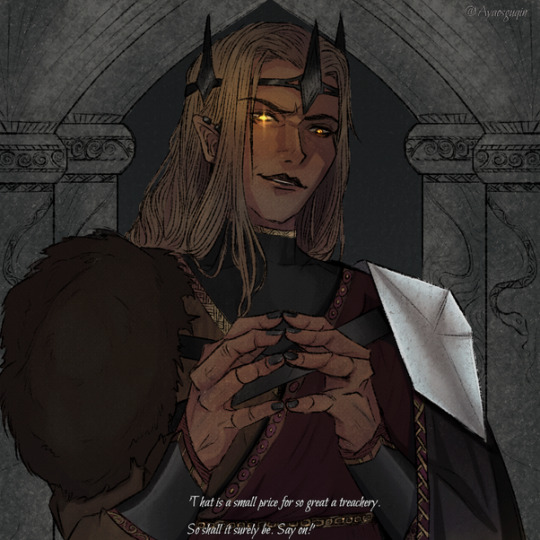
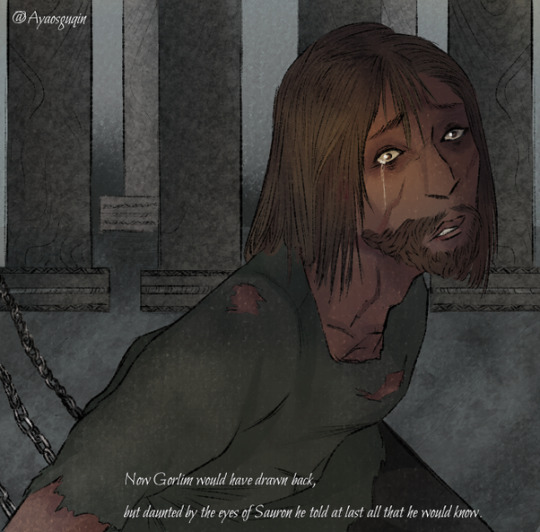
By @ayaosguqin
See, this is one of the things that makes Sauron different from Morgoth. Morgoth is spiteful and enjoys sewing discord and causing destruction for the sake of it, but we haven’t seen this kind of calculated sadism from him yet. (There’s not much that’s subtle about busting in with a giant spider and killing trees.) Sauron, having been a Maia of Aulë, has an appreciation for subtlety and craftsmanship. Sauron likes to stick the knife in and twist it. And as The Lord of the Rings makes clear, he’s a master of psychological warfare.
Now that Sauron knows where the secret camp is, his forces attack the men at Tarn Aeluin. They massacre everyone, save Beren. Beren is out on a spy mission when the Orcs attack, and he has a dream in which Gorlim’s ghost appears to him to tell him what happened. Beren rides back, but it’s already too late. He finds his father and everyone else dead.
Beren builds a cairn for his father and swears vengeance. He hunts down all the Orcs, slaughtering them by himself. He sneaks near their camp, where they’re gloating and holding up his father’s hand as a trophy. On the severed hand is a ring, the ring that Finrod Felagund gave to Barahir. Beren swoops in, steals the hand with the ring, and runs off before the Orcs have a chance to react.
Beren lives by himself in the wilderness for some time. He befriends the animals, and becomes a vegetarian as a result. He manages to perform many heroic deeds just in that time, so that he becomes famous. He’s already such a legend that Morgoth puts a price on his head, just as high as that of King Fingon himself, but the Orcs are so afraid of Beren that they avoid him instead of hunting him. Morgoth resolves to send an entire army after Beren, and not just any army — an army of werewolves, captained by Sauron himself.
The werewolves are enough to chase Beren away from the land where he buried his father. He heads south, towards Doriath. He resolves to pass through Queen Melian’s magic wall, for some reason. (Maybe because it’s the only guaranteed safe place?) He travels along sheer mountain cliffs, and through the spider-infested wastes that had been twisted by a combination of Sauron’s magic and Melian’s magic. That land was basically the Mordor of its day, and no one knows how Beren got through it; whatever he experienced there was terrifying enough that he never spoke of it again. When he arrives at the magic wall, he passes right through like it isn’t even there. This event had been predicted by Melian herself: ‘because the power of that Man’s destiny will overcome her own. People will sing about that event until the distant future, when Middle-earth is unrecognizable.’
He finds himself in the north of Doriath, a forest called Neldoreth. He’s exhausted and harrowed, having spent years traveling through a cursed land. But everything in Neldoreth is beautiful, it’s summertime, and Beren sees a beautiful Elf maiden dancing on the grass. It’s Lúthien, the daughter of King Thingol and Queen Melian themselves. Lúthien is the most beautiful person alive. (Like, metaphysically.) Being the child of a Maia, she is more or less a demigoddess.

Encounter of Beren and Lúthien by Elena Kukanova
Beren is instantly smitten. In fact, he’s literally enchanted by her — just watching her casts a spell on him. When she suddenly vanishes, he literally can’t speak. He wanders the woods like an animal, searching for her. He doesn’t know her name, so he calls her Tinúviel, which means “Nightingale” in Sindarin. A whole year passes, and he sees her in the beauty of nature around him, like she’s a ghost and he’s fondly recalling her memory. A whole winter later, she reappears, and sings a song so beautiful that it brings spring back to the woods:
Keen, heart-piercing was her song as the song of the lark that rises from the gates of night and pours its voice among the dying stars, seeing the sun behind the walls of the world; and the song of Lúthien released the bonds of winter, and the frozen waters spoke, and flowers sprang from the cold earth where her feet had passed.
When he hears her song, Beren can suddenly speak again. He calls out to her, using the name “Tinúviel.” Luckily for him, Lúthien falls just as in love with him upon seeing him. The narrator says that “doom fell upon her” as soon as she loved him back, which could mean either that she met her destiny or that she is going to die for her love. Probably both.
Beren goes to embrace her, but she vanishes again as soon as day breaks. Beren immediately feels a mixture of ecstasy and anguish. He falls into a coma, and has nightmares about groping through the dark to find the
vanished light. (I’m starting to note parallels between Lúthien and the Two Trees, and also the Silmarils.) But Beren’s anguish is nothing to Lúthien’s. Now that she’s fallen in love with a mortal, her fate is inextricably intertwined with his. She’s no longer free.
Lúthien returns to Beren and wakes him from his coma. They walk through the woods together, blissfully in love, throughout that spring and summer. Presumably they talk and actually get to know each other in that time.
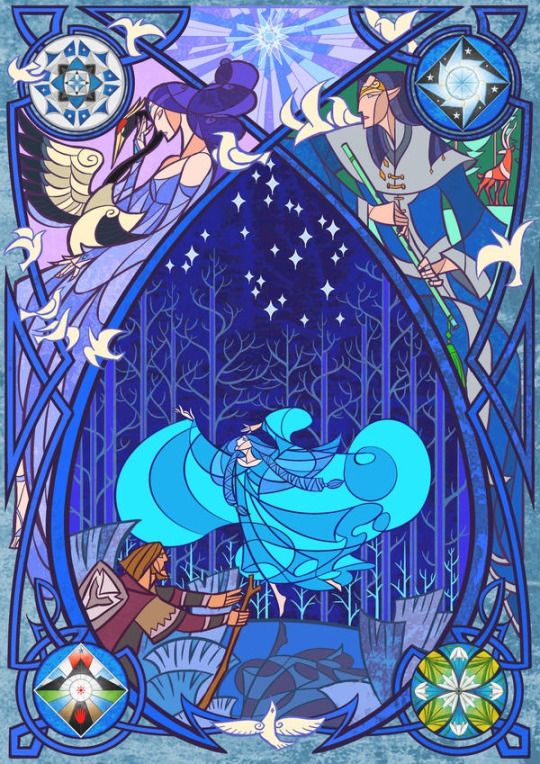
A sudden in love by breath-art and aglargon
There’s another person who loves Lúthien, an Elven bard named Daeron. He spies on Beren and Lúthien in the woods. Jealous that Lúthien loves Beren instead of him, he goes and tattles to Thingol about their relationship. (In the Lay of Leithian, Daeron — in his envy — is able to cast a spell of silence upon Beleriand, so that there is no music or even birdsong.) Thingol is immediately furious, because he’s extremely overprotective of his daughter, and he hates Men. He confronts Lúthien about her new boyfriend, but she refuses to say anything until Thingol promises that he won’t hurt or imprison Beren. Lúthien personally leads him before her father’s throne.
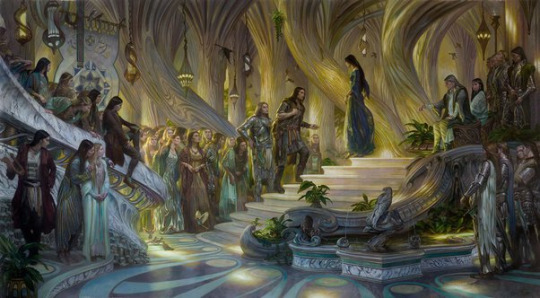
Beren and Luthien in the Court of Thingol by Donato Giancola
Thingol demands to know who Beren is, but he’s so intimidating that Beren is stunned into silence. Lúthien answers for him. Thingol tells Lúthien to back off and let Beren speak for himself. What’s Beren’s excuse for entering the forbidden realm of Doriath? Beren’s response is very poetic and eloquent, but basically boils down to “I want to fuck your daughter.”
There’s pin-drop silence in the hall as the assembled Elves wait for Thingol to smite Beren. Thingol immediately regrets his promise not to harm him. Thingol’s response is to fold his hands, smile coldly, and say,
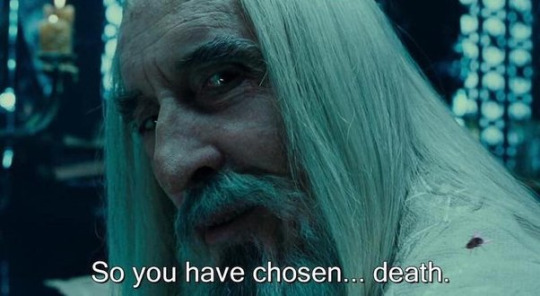
(I mean, it’s not these exact words, but it’s close enough.)
Thingol accuses Beren of being a spy and a thrall of Morgoth, at which Beren takes offense. Beren isn’t afraid of death, but he won’t allow himself to be insulted by any Elf, even a king. His father was a lord of Men and he deserves to be treated like a prince! He has a ring given to his father by Finrod himself, for Eru’s sake! He holds up the ring, and all the Elves see it. This is the Ring of Barahir, which will eventually get passed down to Aragorn. The jewels set in it were originally cut by the Noldor in Valinor itself.
Melian whispers to her husband that he won’t be the one to kill Beren. Beren has a lot more stuff he’s destined to do, but his destiny is still intertwined with Thingol’s. Whatever Thingol does next will seal his own fate, too. Thingol proceeds to choose the stupidest thing possible.
Beren wants to marry the Faerie King’s daughter. So, as is common in fairy tales, Thingol sets him an impossible task that he must complete to earn Lúthien’s hand: He must steal a Silmaril from the crown of Morgoth. Thingol feels like this the nearest thing to a fair price for his daughter. Of course, like most mythological kings, he’s hoping that Beren will die in the attempt.
You can just hear Melian’s facepalm through the page.
As is hopefully clear by now, the Silmarils are like a bomb waiting to go off. Everything about them is fraught — from the fact that they contain the last light of the Trees, to Morgoth’s obsession with them, to the Curse laid on all Fëanor’s sons for their unbreakable oath to get them back, etc. etc. Thingol’s choice to get involved in that shitshow was a dumb fucking idea. It’s not really his place to say or do anything concerning the Silmarils, and he effectively dooms his own kingdom by involving himself with them. In fact, by doing so, Thingol subjects himself to the same Curse that affects all the Noldor — you know, the reason he banished them from his kingdom and banned their language in the first place.
But that’s getting ahead of ourselves. Let’s get back to Beren, who responds to this by literally laughing it off and calling it easy:
“For little price,” he said, “do Elven-kings sell their daughters: for gems, and things made by craft. But if this be your will, Thingol, then I will perform it. And when we meet again my hand shall hold a Silmaril from the Iron Crown; for you have not looked the last on Beren son of Barahir.”
I like the parallelism here: Both Beren and Sauron call something that’s extraordinarily valuable to someone else a “little price” or “small price.” Obviously, we’re supposed to side with Beren in this instance, but I wonder if his pride will be his fall.
Having received his main quest, Beren leaves Menegroth.
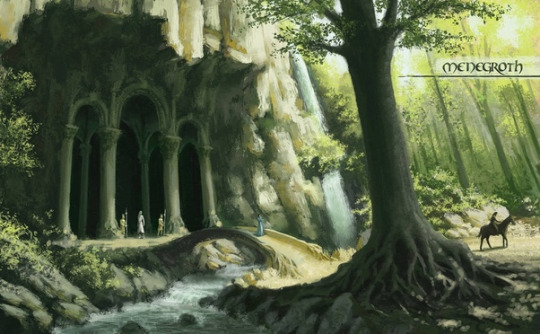
Menegroth by David Gresit
Melian tells Thingol what an idiot he is for involving himself in the Main Plot and forsaking his kingdom’s safety in isolation. She can’t protect him from whatever happens next. Thingol is pretty confident that Beren’s going to die, which proves that he’s not Genre Savvy enough to make good decisions from here on out. He should really listen to his wife.
Lúthien doesn’t quite enter “but Daddy, I love him!” territory, but she does stop singing. All of Doriath is eerily silent.
Beren travels west, towards the River Sirion, and then to Nargothrond. Being alone and with no resources, he doesn’t have any other option but to go to Finrod for help. He wisely holds up the Ring of Barahir as he enters Finrod’s territory, because it was originally Finrod’s ring, and his Elf snipers would know not to shoot. Knowing that he was being watched by an army’s worth of hidden Elves, he randomly yells out “I am Beren son of Barahir! Take me to your King!” in the middle of a field in the hopes that someone will hear him and decide not to kill him. After doing this several times, he’s apprehended by the archers and taken to Finrod.
Finrod receives Beren warmly. Privately, Beren tells Finrod about his father’s death and about meeting Lúthien. He cries more over remembering Lúthien than remembering his father. Remember, Finrod promised to help Barahir or any member of his family in need, because they had saved him. So, he has no choice but to help Beren retrieve a Silmaril, even though he knows it will not go well.
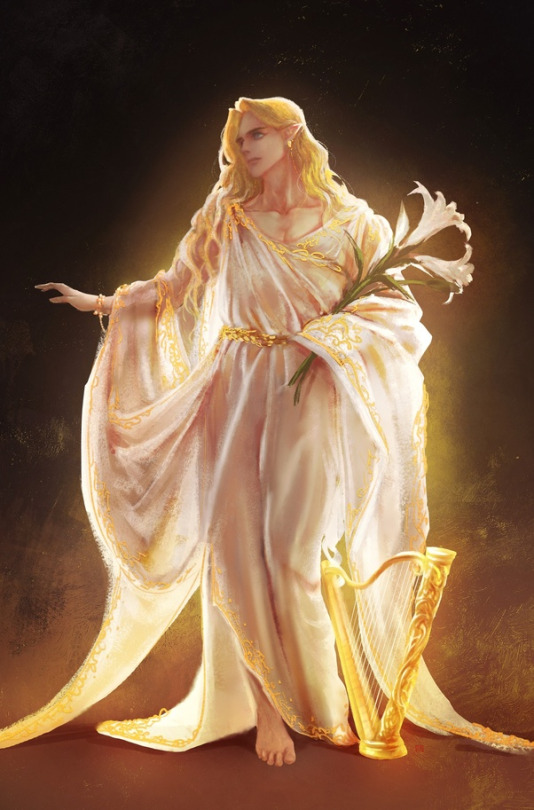
Finrod by yidanyuan
He tells Beren, ‘Well, it’s obvious that Thingol wants you dead, but if anyone so much as mentions the Silmarils, the sons of Fëanor are on them like a pack of wolves. Celegorm and Curufin are powerful lords in my court, and I can’t risk antagonizing them. If they find out you want a Silmaril, they’ll kill you. But I made a promise to your father, so I have to help you. In short, we’re all screwed.’
For some reason, Finrod decides that the best thing to do is to be as transparent as possible. So, he summons his court and stands before his people. He tells them all about the promise he made to Barahir, and how he is therefore obligated to help Beren. He asks his lords for help. Celegorm’s response is predictable. He repeats the Oath of Fëanor, reaffirming that the sons of Fëanor will hunt down anything alive that dares to seek a Silmaril. He goes on a tirade as impassioned as the one that Fëanor originally gave to the Noldor back in Valinor. (Like father, like son, I guess.) Then Curufin speaks, more quietly. What he says boils down to: ‘Nice kingdom you’ve got here, Finrod. Would really be a shame if something happened to it.’
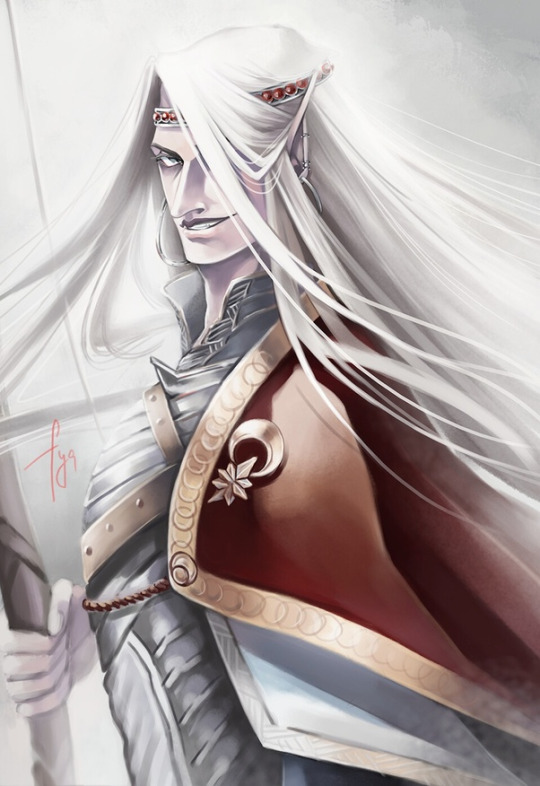
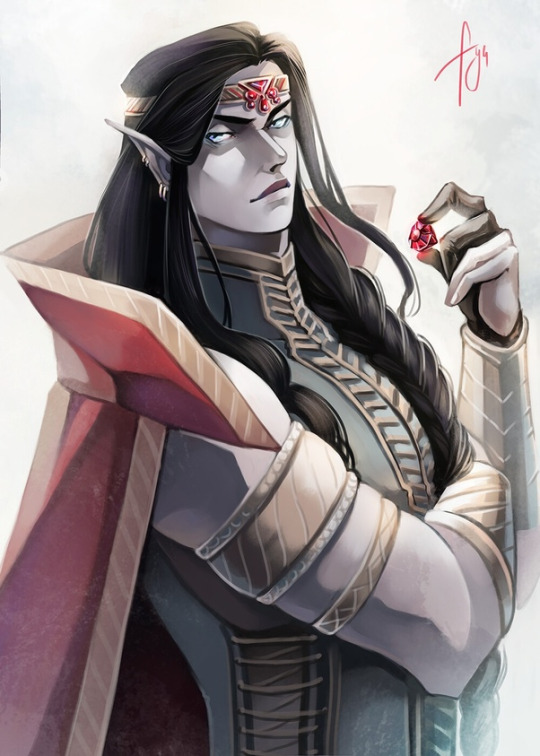
Celegorm and Curufin, by Julia Reizen
Curufin’s speech scares the Elves of Nargothrond so much that they avoid open war for decades, preferring guerilla warfare with arrows, poisoned darts, and magic. According to Tolkien, this is less valorous than open combat, and diminishes their whole society.
Say what you will about Fëanor and his brood, they’re damn good at public speaking.
The Elves of Nargothrond begin to murmur amongst themselves that Finrod can’t tell them what to do as though he’s a Vala (even though he’s… y’know… the king), and all of them refuse to help him. The Curse is in full effect: Celegorm and Curufin realize that this is a golden opportunity to send Finrod alone to his death, and take over Nargothrond for themselves.
Finrod reads the room. He takes off his crown, and throws it at his feet, renouncing his rulership of the kingdom that he built. He looks directly at Celegorm and Curufin and tells them that while they may be faithless bastards who will break their oath of loyalty to him, he will not break his own promise to Barahir. He addresses the rest of the room — there’s got to be at least a few people who haven’t been affected by the Curse, and who will follow him, so that he isn’t pathetically driven out of his own kingdom. Right? A grand total of ten people stand up for him. One of them, Edrahil, picks up Finrod’s crown, and says that it should be given to a steward instead of being left for Celegorm and Curufin to snatch. Whatever happens, he says, Finrod is still the true king of Nargothrond. #IStandWithFinrod.
Finrod chooses Orodreth, his nephew (or youngest brother; sources differ), as his steward. Celegorm and Curufin just smile and withdraw from the room, which isn’t creepy at all.
Finrod and Beren leave Nargothrond with their ten loyalists. They travel north, come upon a band of Orcs, and kill them all. Finrod uses a magical illusion to disguise his company as Orcs, and they sneak through the mountain pass towards Angband. Sauron finds them anyway, and intercepts them. Sauron and Finrod engage in — of all things — a singing competition. It’s very similar in principle to “the oldest game” from Neil Gaiman’s The Sandman, in that it’s a battle between dueling concepts that are instantaneously manifested as the singers describe them. Sauron sings about treachery, betrayal, uncovering secrets, piercing through things, and sorcery. Finrod answers with a song about resistance against evil, keeping secrets, maintaining trust, standing strong, and gaining freedom.

Finrod and Sauron by rami-fon-verg
There is something simple, almost childish, about this back-and-forth. I feel like I’ve seen several different children’s shows in which a good character and an evil character sing at each other instead of fighting, with the evil character extoling the virtues of power and the good character singing about the importance of love. (The one that comes to mind is Barbie and the Diamond Castle, in which the two heroines and the villain play good/evil music at each other, and the good music overpowers the evil music, resulting in the villain’s defeat.) I wouldn’t be surprised if several anime have a scene like this, as well. And yet, it is primordially powerful, like Gaiman’s “oldest game.” In Tolkien’s universe, singing was what created the world in the first place, and singing is therefore a direct and powerful means of manifestation.
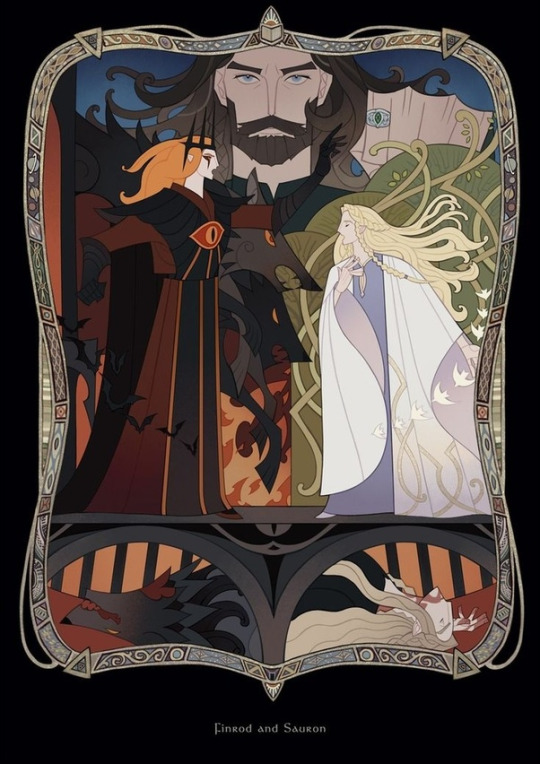
By Wavesheep
Unfortunately, it does not end the way it would if this were a Barbie movie or an anime. Finrod is a great singer, but Sauron is better — he is a Maia, one of the Ainur, meaning he was there when the original Music of creation was sung. It’s impressive that Finrod manages to hold out as long as he does, but in the end — much like Fingolfin and Fëanor before him — he loses.
To tell this part of the story, Tolkien randomly switches to verse; he quotes a section from the Lay of Leithian. Medieval texts actually do this; lots of them will randomly switch between prose and verse. Texts that do this are called “prosimetric.” For example, in the Volsung Saga (which reads very much like The Silmarillion), when Sigurd meets Brynhild, the text abruptly switches into verse as she lists all the different types of runes and their uses. There’s several other instances in that text when it randomly switches between prose and verse. It prefaces the verse parts with something like, “So saith the song of Sigurd,” referencing poetic versions of the same story that otherwise don’t survive. Tolkien evokes that same structure here, right down to saying “as it is told in the Lay of Leithian.”
The Lord of the Rings is prosimetric, too, but most of the songs are diegetic, meaning they’re actually being sung by characters in-universe. That’s not what’s going on here. The verse part describes the singing contest between Sauron and Finrod, it’s not the actual songs that they’re singing. But it’s really clever of Tolkien to switch to verse to describe this scene, because it sets the vibe! It’s like you’re listening to a distant echo of their songs, passed down through generations of oral storytelling. It wouldn’t be nearly as evocative if he just described the scene flatly in prose.
Thank you for indulging me in that tangent! Moving on: Sauron throws Finrod and co. into a dark pit, and threatens to kill them if they don’t tell them who they are and why they’re there. Periodically, he sends a werewolf to eat one of them (which, I’ll bet you anything, is a direct reference to the Volsung Saga). Still, none of them talk.
Meanwhile, back in Doriath, Lúthien intuitively senses that something is wrong, and asks her mother what has happened to Beren. Melian tells her that Beren is in Sauron’s dungeon. Lúthien resolves to go and rescue him by herself. She goes to ask Daeron for his help, but Daeron refuses to risk his own neck for Beren’s sake. He’s been afflicted with full-on incel syndrome, so out of spite, he snitches to Thingol a second time. (Thingol is so grateful that Daeron keeps tabs on his daughter for him, that he names Daeron a prince. Make of that what you will.) Thingol can’t imagine anything worse than letting his daughter waste away in a dark pit, so he builds a house in a giant beech tree, called Hírilorn. Because the best way to keep your daughter safe from one prison is to put her in another! Logic!
Well, it’s a common trope in myths and fairy tales: The king is overprotective of his daughter and puts her in a tower, or a box with a hole in the roof, or some such. Lúthien, however, is proactive. She doesn’t wait for someone to rescue her from her treehouse. Instead, she tricks her guards and Daeron into sending her a golden bowl of wine, a silver bowl of water, a spinning wheel, and a loom. Then she sings a spell that mentions all the tallest and longest things in the world, which causes her hair to grow extremely long. She mixes the wine with the water, then sings a song of day over the golden bowl, and a song of night over the silver bowl. Finally, she sings a song of sleep. The singing enchants her hair, filling it with corresponding ideas that shape the way Lúthien wants it to behave. (Similar to Sauron and Finrod’s magic songs, singing about an idea causes it to manifest.) She weaves a robe out of her hair, a robe that’s described as being misty and shadowy, like it’s woven from clouds at night. Lúthien weaves a rope out of what’s leftover, and puts a sleeping spell on it. Then she just throws it down onto the guards at the foot of the tree, and they go to sleep, allowing her to climb down the rope and escape.

Lúthien prepares her escape from Hírilorn by Anke Katrin Eißmann
As she leaves Doriath, she comes upon Celegorm and Curufin, of all people. They’re out hunting, hoping to learn something about what happened to Finrod (and probably plotting behind his back the whole time). Among their hunting dogs is a particularly large wolfhound called Huan, who actually came with them from Valinor. Oromë himself, the Vala of the hunt, gave the dog to Celegorm long ago. Huan loyally followed Celegorm into exile, and therefore became automatically subject to the Curse. He’s foretold to die, but only after he faces the biggest and baddest of big bad wolves.
Spoiler alert, the dog’s gonna die!
Huan finds Lúthien, because he’s immune to her enchantments, and brings her to Celegorm. Once she learns that Celegorm and Curufin are enemies of Morgoth, Lúthien decides that she trusts them, and reveals herself to them. Celegorm (or, in the Lay, Curufin) instantly falls in love with her, because… of course he does. He offers to help Lúthien, making a point not to say that he already knows about the quest. Lúthien goes with them to Nargothrond.
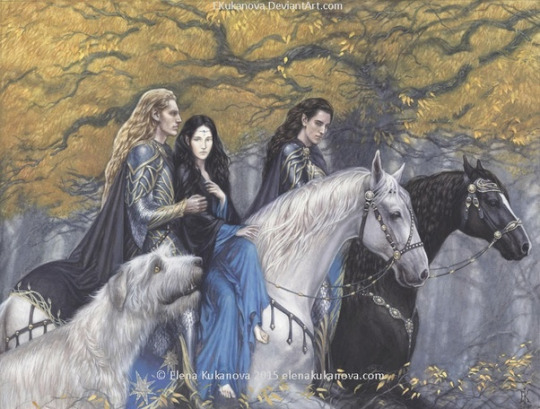
Celegorm and Curufin find Lúthien by Elena Kukanova
As soon as they get there, Celegorm and Curufin show their true colors. They imprison Lúthien, take away her magic cloak, and forbid her to speak to anyone else but them. Lúthien escaped one trap, and fell right into another. Now that the brothers know from Lúthien that Finrod and Beren are in Sauron’s prison, they figure that it’s easiest to just let them die. Nargothrond is as good as theirs. And now that they have Lúthien, they have leverage over Thingol — they can force him to give Lúthien’s hand in marriage to Celegorm. That would make Celegorm and Curufin the most powerful princes of the Noldor! [Insert evil laugh here.]
Huan, however, is the Goodest Boy and is too pure-hearted to follow Celegorm (even though Celegorm is his beloved master whom he’s been serving for literally centuries). Huan also fell in love with Lúthien upon seeing her for the first time, but in a decidedly less creepy way. He comes to her prison every night to keep her company, and Lúthien tells him all about Beren.
Huan decides to help Lúthien break out. He brings her magic cloak to her, and speaks to her (he’s only allowed to talk three times before he dies). He shows her a secret passage out of Nargothrond, and they escape together. Huan even swallows his pride enough to allow Lúthien to ride on his back.
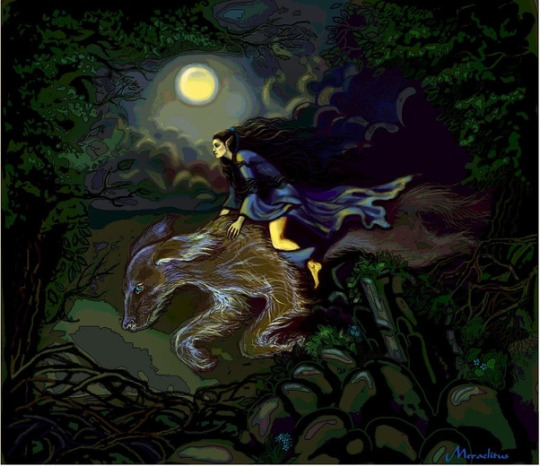
Lúthien riding on Huan by Meraclitus
I mean, if you’re gonna be a damsel in distress, a dog is a pretty awesome thing to be rescued by.
(Stopping there, because I'm running up against the max number of images. More to come!)
#the silmarillion#the silm#silmarillion#silm art#the silm art#the silm fandom#silm fandom#beren and luthien#fingolfin#morgoth#beren#luthein#luthien#finrod felagund#celegorm#curufin#thingol#melian#sauron#tolkien#jrr tolkien#j.r.r. tolkien#middle earth#long post
57 notes
·
View notes
Text























The Lay of Leithian Part 28: The Duel of Fingolfin and Morgoth, Rise of Carcharoth, and Coming of Beren and Lùthien to Angband's Gates
<<<Part 27 Part 29>>>
None of the artwork used is my own. Credits to the artists!
#silmarillion#tolkien#Lay of leithian#Leithian#Fingolfin#Morgoth#Melkor#Carcharoth#Beren#Huan#Luthien#silmedit#tolkienedit#Leithianedit#I am so sorry this took so long#Blame the wifi problems
62 notes
·
View notes
Text
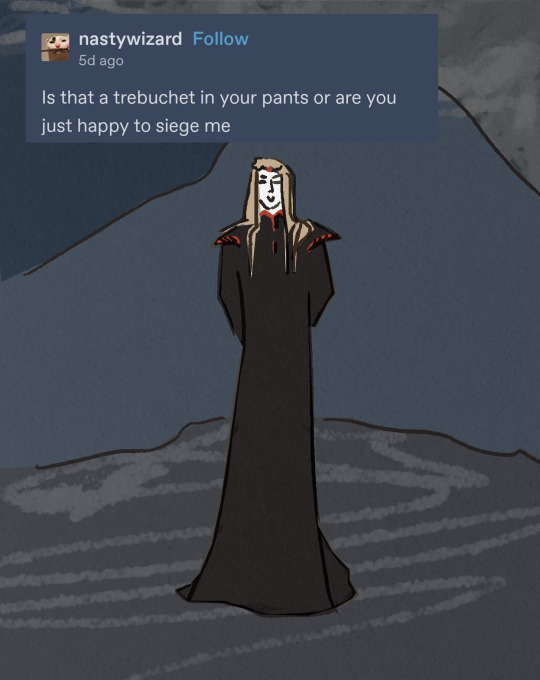
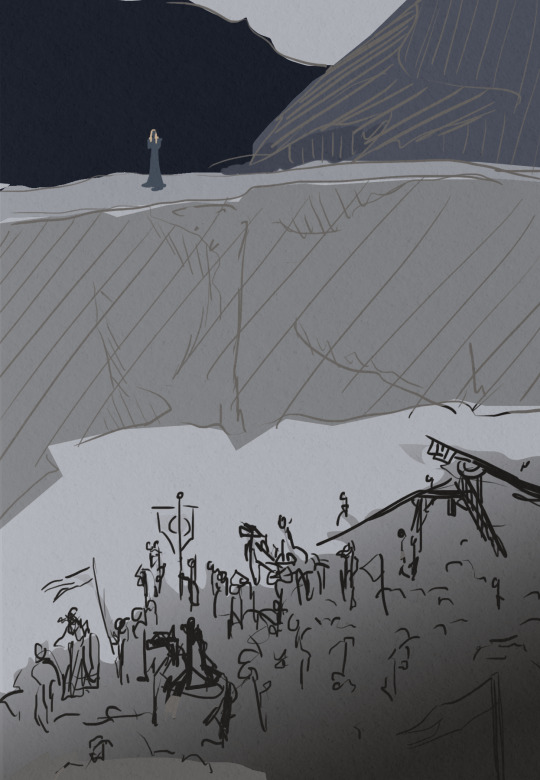
Gates of Angband, FA 60
#absolute dead silence you can hear the crickets#sauron#silmarillion#silm#somewhere deep in the iron hill morgoth face palms#my art
258 notes
·
View notes